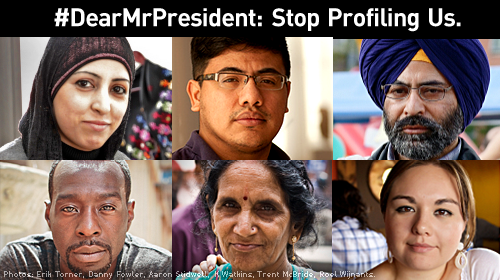
The Justice Department is considering revised racial profiling guidance that, if issued, could set back race relations and basic fairness in this country. We hope that it does not make that mistake.
The New York Times on Thursday reported that “long-awaited revisions to the Justice Department’s racial profiling rules would allow the F.B.I. to continue many, if not all, of the tactics opposed by civil rights groups, such as mapping ethnic populations and using that data to recruit informants and open investigations.” In light of the Obama administration’s recent and deservedly lauded criminal justice policy reforms, we had expected it would take a far different approach to racial profiling than this. After all, revisions to racial profiling rules that retain loopholes permitting racial, religious, and national origin profiling are not the reforms that Americans need and deserve.
The Justice Department guidance that urgently needs revision was issued in 2003 by Attorney General John Ashcroft. The Ashcroft Guidance bans racial profiling, which it condemns as discriminatory, “not merely wrong, but also ineffective,” and “patently unacceptable.” Despite these strong words, the Ashcroft Guidance contains gaping holes: It does not prohibit profiling based on religion or national origin and permits racial, religious, and ethnic profiling in national security investigations and at the nation’s borders.
The Ashcroft Guidance’s loopholes thus gave federal law enforcement express permission to discriminate against America’s minorities. And wrongful discrimination in the national security and border contexts quickly spread to others. Government records obtained by the ACLU showed the FBI mapped minority communities around the country based on crude and false stereotypes about their propensity to commit crime. The targeted communities include Arab Americans in Michigan, African Americans in Georgia, Chinese and Russian Americans in California, and Latino Americans in multiple states.
Mapping is just one part of the problem.
Using expanded authorities that permit investigations without actual evidence of wrongdoing, the FBI has also targeted minority communities for interviews based on race, ethnicity, national origin, and religion. It has used informants to conduct surveillance in community centers, mosques, and other public gathering places and against people exercising their First Amendment right to worship or to engage in political advocacy. And among America’s minority communities, “flying while brown” soon joined “driving while black” as a truism of government-sanctioned discrimination and stigma. It’s hard to overstate the damage done to the FBI’s relationship with minorities, particularly American Muslims.
The damage, however, has spread further.
When federal law enforcement leads in discriminatory profiling, state and local law enforcement will follow. Nowhere is that clearer than in New York City, where the NYPD – which is twice the size of the FBI – launched a massive program of discriminatory surveillance and investigation of American Muslims, mapping the places where they carry out daily activities and sending informants to spy on mosques and Muslim community organizations, student groups, and businesses. After the Associated Press broke a series of stories describing this program in stark and shocking detail, the NYPD defended itself, arguing that it was only doing what the FBI was permitted to do. Again, it’s hard to overstate the harm.
From the ACLU’s work with New York’s Muslim communities, we know that a generation of youth is growing up fearful of its local police force, scared to exercise the rights to freedom of worship, speech, and association.
Fortunately, the issuance of the revised Guidance on Race has been delayed and both the Justice Department and the civil rights community have a crucial opportunity to put a spotlight on the FBI, which vigorously opposes those fighting for equality. According to the New York Times, the FBI’s argument seems to be that it needs to identify where Somalis live to investigate potential Somali terrorism suspects.
But that argument must be rejected for the same reason that we reject it in other contexts.
Many mass shooters are young white males, yet we rightly don’t map where whites live or send informants to majority white communities to ferret out potential mass shooters. Put another way, the FBI’s argument presumes what the Ashcroft Guidance “emphatically rejects”: that crime can be prevented by the mass stereotyping of entire communities. Not only is that wrong, it is a ham-handed approach that squanders resources that should properly be devoted to investigating actual wrongdoing.
Most importantly, President Obama needs to step in. He has the ultimate authority to make the FBI stand down and to ensure that his administration does not issue racial profiling guidance that permits bias-based policing. As a coalition of 225 groups from across America’s civil rights and minority communities , the guidance must:
- prohibit profiling based religion, national origin, or sexual orientation;
- close the loopholes for the border and national security;
- apply to state and local law enforcement agencies who work in partnership with the federal government or receive federal funding;
- cover surveillance activities; and
- contain enforceable standards.
If these crucial changes are not made, the civil rights legacy of President Obama and Attorney General Holder will be forever marred by discrimination.
Learn more about racial discrimination and other civil liberties issues: Sign up for breaking news alerts, , and .

